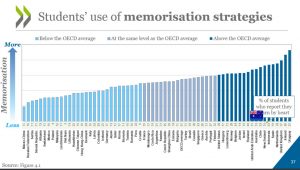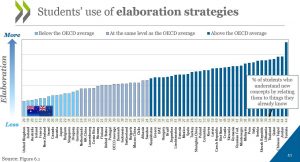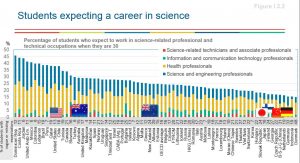From the Principal

“The world will no longer reward you for what you know
It will reward you for what you can do with what you know.”
Andreas Schleicher OECD
Over the course of the September break, I was fortunate to attend the biennial conference of the Australian Heads of Independent Schools Association (AHISA) in Queenstown, NZ. The final keynote address at the conference was a presentation by Professor Andreas Schleicher, the Director of Education & Skills and Special Advisor on Education Policy to the Secretary-General at the Organisation for Economic Co-operation and Development (OECD).
As one of the world’s most influential educational experts, the Professor of Physics and Statistics, Schleicher was able to draw on an extraordinary level of data from assessment instruments used across the globe. Most commonly known is the Programme for International Student Assessment (PISA), which Schleicher develops as part of his work, and the Teaching and Learning International Survey (TALIS). His presentation provided a wealth of research comparing the academic performance, student resilience, teacher perception, class size and career aspirations of students in over 70 different countries.
The PISA Test is an international survey held every three years that pits the world’s education systems against each other by testing the performance of 15 year olds. Schleicher suggests this particular test can help understand why some countries perform better than others and helps to explain the apparent declining scores evident in recent years in Australia.
Schleicher commented that the PISA testing for Australian students reveals there is considerable surface learning, with memorisation a very dominant approach to learning when compared to the top performing education systems (Finland, Singapore and Korea), where there is a stronger focus on more deep conceptual understanding.

Despite this worrying trend, Schleicher recognises some things are best mastered by memorisation; for example, learning your times tables and / or learning characters in a foreign language which are both needed to assist further learning. Memorisation helps when the tasks are easy but as the tasks become more complex, memorisation becomes less effective as a learning tool. What was revealed in the PISA data was that Australian students struggled with the complex reasoning tasks.
As the OECD writers evolve the test instruments at PISA, greater emphasis is being placed on testing complex reasoning tasks simply “because the modern world relies less and less on knowing subject matter, and rewarding what you know but rather what you can do with what you know”. Thus, memorisation as a learning tool will be less and less effective.
By comparison, students’ use of elaboration strategies in Australia was measured as considerably lower than many countries across the world. Elaboration strategies focus on linking what you know with what you don’t know. Integrating themes of knowledge and creatively using knowledge. A prevalence of elaboration is revealed through a student’s ability in critical thinking, creativity, non-routine problem solving, deep learning and reasoning.

It is worth noting that elaboration strategies are not effective for performing simple tasks thus suggesting a balance of both elaboration and memorisation strategies are needed. However, if students are to lift the Australian PISA test scores, our curriculum and teaching in Australia needs a greater focus on teaching elaboration strategies, with complex reasoning tasks explicitly embedded in the curriculum. Such results go a long way to explaining why Australia is not at the top of the list.
The current syllabus requirements in many VCE subjects strive to achieve a balance of ‘elaboration’ and ‘memorisation’ strategies. However, in my opinion, a greater emphasis placed on the critical thinking, non-routine problem solving and deep reasoning requirements should be a continued focus. If we are to follow the lead of Schleicher and his view that the modern world “relies less and less upon knowing the subject matter, and rewarding what you know but rather what you can do with what you know”, a greater step in this direction with syllabus requirements is warranted.
Schleicher’s biggest criticism, however, of the Australian instructional system as based on the PISA results reveal that our curriculum is “sort of a mile wide but often an inch deep”. The term ‘crowded curriculum’ is often used by teachers to describe the current Australian curriculum requirements.
When you could still assume that what you learned in school will last for a lifetime, teaching content and routine cognitive skills were at the centre of education. Today, where you can access content on Google, where routine cognitive skills are being digitised or outsourced, and where jobs are changing rapidly, the focus should be on enabling people to become lifelong learners, to manage complex ways of thinking and complex ways of working and to live in a multi-faceted world as active and responsible citizens.
On a more positive note, the research undertaken as part of OECD programs highlights a very different story for students’ expectations of careers. When looking specifically at Science, students were asked if they were aspiring to a career relating to science, or would expect a career in science; the results were certainly interesting. Countries where the students perform well in Science – Japan, Finland, China, Germany – very few students wanted to actually study Science or to become a scientist. The scientific knowledge and skills being taught at school were not translating to science career aspirations or careers in science.
In contrast, 15 year old students in the USA and Australia, who do not necessarily perform as well in the PISA Science test as other countries, had considerably higher aspirations for scientific careers. Schleicher believed this was an encouraging insight and highlighted the notion that teaching in Australia was capturing the imagination of students to study science.

In closing, Schleicher’s final comment was a challenge to all educators to ‘look at the data’ and certainly reflective of a scientist with the most incredible global research available at his fingertips: “without data, you are just another person with an opinion”
For those interested in understanding more of Schleichers research, the Use Data to Build Better Schools Ted Talk is worth watching.


